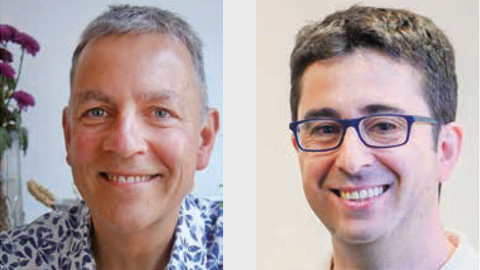Òscar Vilarroya and Albert Quintana receive "la Caixa" 2019 research grants

17/09/2019
The "la Caixa" Foundation recently awarded a total of 28 million euros in grants to 79 pioneering research and social impact projects. The grants were awarded by President of the Foundation Isidro Fainé; Director General Jaume Giró; Javier Solana, member of the Board of Trustees and of the foundation's expert Research Advisory Board; and Pedro Duque, Spanish Minister fro Science, Innovation and Universities. The research projects belong to three lines of action in research conducted by the "la Caixa" Foundation: post-doctoral grants aimed at fostering talented researchers; support to excellence in research in biomedicine and health with the Health Research grant, and the CaixaImpulse programme, aimed at transferring biomedical research results to society.
Lecturer Òscar Vilarroya from the Department of Psychiatry and Legal Medicine at the UAB will receive a total of 972,414 euros under the Health Research call. This is the second edition of the grants call and a total of 25 research initiatives of scientific excellence and social impact in biomedicine and health have been selected, focusing on both basic and clinical/translational research. The objective of the call is to foster projects of excellence in the fight against some of the most devastating diseases, such as cardiovascular disease, neurological disorders, infections and cancers.
The project led by Òscar Vilarroya: Dynamics of the neural, metabolomic and neuropsychological signatures underlying the adaptations for motherhood during pregnancy, aims to study how the brain is modified during pregnancy to prepare them for maternity. Researchers have discovered a network of brain areas which undergoes important changes during at least the first two years and is involved in the way the mother treats her newborn. But there are still many questions which need to be answered. The objective of this project is to determine when and how the brain reorganises itself during pregnancy, as well as to identify which hormonal mediators facilitate and direct this reorganisation. The final objective will be to related these neuronal and hormonal discoveries with the behaviour of mothers, as well as examine the appearance of mental disorders during the postpartum period.
Within the CaixaImpulse programme, which this year has awarded 21 grants to centres across the European Union with innovative projects related to the biomedical field, researcher Albert Quintana from the UAB Department of Cell Biology, Physiology and Immunology and member of the UAB Institute of Neuroscience, will receive between 70,000 and 100,000 euros, depending on the first stage of his research, to develop the project MitoCBD: Cannabidiol for mitochondrial disease.
The research conducted by lecturer Albert Quintana focuses on mitochondrial diseases, a set of deficits of the mitochondria causing debilitating and often fatal pathologies in one out of every 5,000 individuals. These neuromuscular diseases mainly affecting children cause severe multiple organ failure and death. There is no known cure for this disease and all existing treatments are ineffective. Current therapies focus on palliative care and vitamins or other supplements without having solid proof of their effectiveness. Researchers recently demonstrated that a daily administration of cannabidiol (CBD), a medical component extracted from the cannabis plant, restores these deficits and raises life expectancy in in vivo mitochondrial disease models. It is important to bear in mind that CBD is neuroprotective, anti-inflammatory, safe and does not contain psychoactive properties, and have been approved by the Food and Drug Administration (FDA), which points to its promising potential as a drug to be used to treat mitochondrial disease.
Therefore, MitoCBD aims to demonstrate even further the increase in CBD effectiveness in comparison to other available options, by generating more data in preclinical models of the disease, with the vital objective of finding a highly needed treatment for these types of devastating diseases.